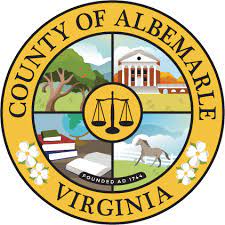At least one in ten American adults will suffer a depressive illness every year, according to information from the National Institute of Mental Health. That information was cited at City Council’s May 2, 2022 work session.
Officials with the Emergency Communications Center for Charlottesville, Albemarle County, and the University of Virginia briefed the Council on efforts to ensure that people experiencing mental health crises are not met with deadly force by public safety officers. (view the presentation)
“We do receive around a quarter of a million calls per year here in the Charlottesville-UVA-Albemarle Emergency Communication Center,” said Josh Powell, the support services manager for the ECC.
Powell said at least 90 percent of the 9-1-1 calls are answered within 15 seconds, an industry standard. He said that at least some of those calls are misdials or hang-ups.
“If you do happen to misdial 9-1-1, please do not hang up,” Powell said. “It is important that you are able to make contact with the communications officer and let them know there is no emergency because otherwise they are going to continue to reach you to confirm that there is not an emergency.”
A new emergency number will soon go into operation. Powell explains about what the 9-8-8 service will do.
“This is going to be a system that responds specifically for mental health crises,” Powell said. “Similar to 9-1-1 you will be able to reach it by call or text.”

Also coming in the future is something called the Marcus Alert, as explained by Sonny Saxton, the director of the ECC.
“The goal of Marcus Alert, if we were to place a singular goal on it, would be to provide a behavioral health response to behavioral health emergencies,” Saxton said. “Essentially Marcus Alert creates that coordination between the 9-1-1 and the regional crisis centers as well as specialized behavioral health response from law enforcement.”
Saxton said there are multiple initiatives to address multiple structural issues, including a shortage of psychiatric beds across all of Virginia.
“The time has long passed for us to deal with these behavioral health emergencies effectively and to understand that it can happen to any of us,” Saxton said.
The Marcus Alert system is intended to identify behavioral health issues whether the call comes in from a crisis line, 9-1-1, the future 9-8-8, or the rest of what’s referred to as the “crisis care continuum.”
“When it comes to 9-8-8 being the new short code if you will to emergency services for mental health crises, it’s really that ‘no wrong door’ approach,” Saxton said. “In order words, you could call any of those. You could call 9-1-1, you can call 9-8-8, you could call the suicide hotline and the idea is you would have a complete continuum of care no matter where you access it.”
Saxton said nearly 80 percent of calls can be resolved over the phone, but the remaining would require mobile crisis teams consisting of local law enforcement, emergency medics, and social workers trained in emergency responses.
“When you put that group together and deploy those into the community, that can really perhaps begin that emergency care treatment at the person’s side and then work on getting them to a crisis stabilization unit and then to a hospital or in-patient care if needed,” Saxton said.
Marcus Alert programs are in different stages of implementation across Virginia. There are two pilot rounds, but the Charlottesville area is not located within either of these. Saxton said it might be some time to have the entire state covered. Region 10 is serving as a “crisis hub” but that’s not connected yet to the ECC.
Legislation passed the General Assembly in 2020 to establish the system across Virginia, but legislation that passed in 2022 carves out exceptions for some communities (SB361).
Saxton said it also took many years for the technology to make 9-1-1 ubiquitous, and the same can be said for implementation of behavioral calls to be as universal.
“Now, we do know that for 9-8-8, the telephone companies have to have that short-code set up by July 1, 2022, so July of this year,” Saxton said.

Saxton said protocols are still in development and there will be more updates in the future.
A sizable group of people in Charlottesville would like to see the Charlottesville Police Department abolished. Mayor Lloyd Snook asked this question perhaps on their behalf.
“I know that a lot of folks in the community want very much for there to be as many opportunities as possible for there to be a non-police response to a mental health crisis,” Snook said. “Is there anything that can be done before we would get to the full implementation of the Marcus Alert System? Any sort of first step that we can be taking?”
Saxton said some steps have already been taken.
“For one, if you do call 9-1-1 today within the Charlottesville, Albemarle and UVA region, that call is answered by a communications officer that has received additional training,” Saxton said. “They’ll answer the phone and use the guidance from a National Academy protocol, so a new standard. They will do so quickly and get you on the line with someone that stay on the line until law enforcement gets there. They’re also trained in how they’re going to dispatch the law enforcement so they’re very careful about the information they give… over the radio to set the correct tone. That’s all training that’s underway that’s already happened.”
Saxton said an alternative is to call the non-emergency line and state that there is a mental health care plan in place.
“That’s essentially what the Marcus Alert voluntary database is,” Saxton said. “If you report to us or to Region 10, that you have a mental health care plan, we can notify law enforcement.”
The non-emergency line is 434-977-9041.
Before you go: The time to write and research of this article is covered by paid subscribers to Charlottesville Community Engagement. In fact, this particular installment comes from the May 9, 2022 edition of the program. To ensure this research can be sustained, please consider becoming a paid subscriber or contributing monthly through Patreon.













